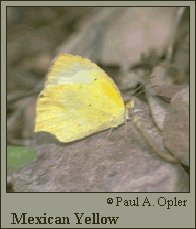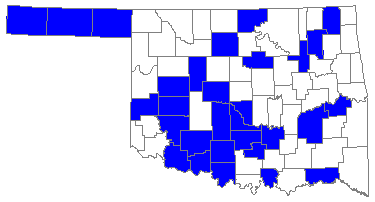 |
 

 |



Mexican Yellow (Eurema mexicana [Boisduval])
Wing span: 1 3/4 - 2 1/2 inches (4.4 - 6.3 cm).
Identification: Upper surface is creamy white with indented black borders which outline a "dog's head" on forewings; more pronounced in male. Hindwing with projecting tail-like points.
Life history: None reported.
Flight: Midsummer to fall as vagrant, all year in tropics.
Caterpillar hosts: Acacia and Diphysa in the pea family (Fabaceae).
Adult food: Nectar from a wide variety of flowers.
Habitat: Open, dry areas: flats, hillsides, deserts, prairies. Found in moister areas in Mexico and Central America.
Range: Resident from Central America north to South Texas and the Southwest; common vagrant in Great Plains and Southwest deserts; rare migrant to Mississippi, Arkansas, Illinois, and Michigan.
Conservation: Not usually required.
Management needs: None reported.
The Nature Conservancy Global Rank: G5 - Demonstrably secure globally, though it may be quite rare in parts of its range, especially at the periphery.
References:
DeVries, P. J. 1987. The butterflies of Costa Rica and their natural
history. Princeton University Press, Princeton, New Jersey. 327
pages, 50 color plates.
Opler, P. A. and G. O. Krizek. 1984. Butterflies east of the Great Plains.
Johns Hopkins University Press, Baltimore. 294 pages, 54 color plates.
Opler, P. A. and V. Malikul. 1992. A field guide to eastern butterflies.
Peterson field guide #4. Houghton-Mifflin Co., Boston. 396 pages,
48 color plates.
Scott, J. A. 1986. The butterflies of North America. Stanford University
Press, Stanford, Calif. 583 pages, 64 color plates.
Author: Jane M. Struttmann
State and Regional References:
Opler, Paul A. 1999. Peterson Field Guide to Western Butterflies, revised
edition. Houghton Mifflin Co., Boston, Mass.
Stanford, R.E. and P.A. Opler. 1993. Atlas of Western USA Butterflies.
Privately published, Denver, Colo.
Tilden, J.W. and A.C. Smith. 1986. A Field Guide to Western Butterflies.
Houghton Mifflin Co., Boston, Mass.

